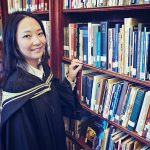Written By: Terri-Lynn Langdon, Lead Editor and Writer, Innovation Hub
At the Innovation Hub one of our projects focuses on engaging International students. International students currently make up 25.4% of the undergraduate and graduate student population at U of T.1 Questions around how the University of Toronto can support this group in the best ways possible and how their needs differ from domestic students is extremely important to the work that the Innovation Hub is engaged in, not to mention that, student engagement and a project by and for students is our bread and butter.
 Meng Xiao recently wrote a book titled Student Engagement in Practice: Chinese International Graduate Student Engagement Handbook which is a book inspired by her own doctoral research from OISE’s Doctorate of Education Program at the University of Toronto.
Meng Xiao recently wrote a book titled Student Engagement in Practice: Chinese International Graduate Student Engagement Handbook which is a book inspired by her own doctoral research from OISE’s Doctorate of Education Program at the University of Toronto.
When talking to Meng about this resource book for Chinese International Students (and the professionals that work alongside them in education) Meng was keen to outline the central questions in her research. Her central questions are:
- How is student engagement perceived in Canadian and Chinese educational systems?
- What are the determining factors that influence Chinese international graduate students’ engagement in Canadian institutions?
- What are the needs of Chinese international graduate students for enhancing their engagement in and out of the classroom?
Meng herself is a young Chinese International student and mother. Growing up in China she would often hear from Chinese parents that if your child goes to the University of Toronto they will be successful. According to Meng’s work, this strong held belief can create a lot of pressure for Chinese International Students on campus as they don’t want to let their families down when they start their studies. In our conversation, Meng shared that there are lot of myths surrounding the post-secondary educational experiences of Chinese International students, and these are important to acknowledge and consider in our communities.
Meng started to explain that although there is a lot of focus back home in China that students apply to U of T, she shared that international Chinese students themselves are far more concerned with what they would like to learn, how they want to use those learnings, and what their programs are doing. Another myth that Dr. Xiao shared is that Chinese international students come from wealthy backgrounds. In our conversation Meng makes it clear that, this could not be farther from the truth. According to Dr. Xiao, what is reflected in her research is that Chinese international students come from diverse backgrounds to student-parents and students that have obligations (Financial, and otherwise) to their families back home in China. She shared that the students in her research have many part-time jobs and most have the expense of international student fees that must be paid in order to complete their education.
Dr. Xiao also shared that there is a perception amongst Canadian Educational Institutions that Chinese International students are not engaged in the classroom or that they are passive learners because they have a tendency to speak up less often in class. Meng says that this is not true. She shares that Chinese International students are deep thinkers who talk less in class as a sign of respect as held in some Chinese cultural practices. Meng also wanted to caution anyone who thinks that this student group talks less in class because English is their second language. Meng asserts that international students must pass rigorous English tests in order to apply to post-secondary studies in Canada. This insight challenges the commonly held assumption that this student group is struggling to learn English.
One of the findings that arose out of her research was the significant struggles Chinese International students experience with cultural shock once they come to Canada, rather than English language learning. These students often have ideas about coming to Canada and U of T, that are not reflected in their experiences after they arrive.
Dr. Xiao stressed that one of the central messages in her research is that Chinese International students in Canada are a very diverse group that requires individual support with attention to the context that individual students are experiencing. Her book recommends resources for Chinese international students, her take home message is for Chinese international students to become engaged and involved in campus and community life and to find other Chinese international students as a support system.
Students supporting students and student success stories is so integral to the work we do at the Innovation Hub. Breaking down myths, stereotypes and prejudice is a continuing practice for the Innovation Hub teams and for U of T students, staff, faculty and the community. While these insights are specific to the important research and work that Dr. Xiao is doing in the community, we hope that some of these insights also resonate with other International students and heightens the learning of domestic students as they navigate their studies and experiences at the University.
You can learn more about Meng’s work by visiting Dream X Education, an educational platform supporting International Students in Canada.
- Link: www.dreamXeducation.ca
1 – This statistic has been sourced from the 2019-2020 University of Toronto Enrolment Report, provided be the Planning & Budget Office (February, 2020)
0 comments on “In Conversation with Dr. Meng Xiao: Supporting Chinese International Students at the University of Toronto”